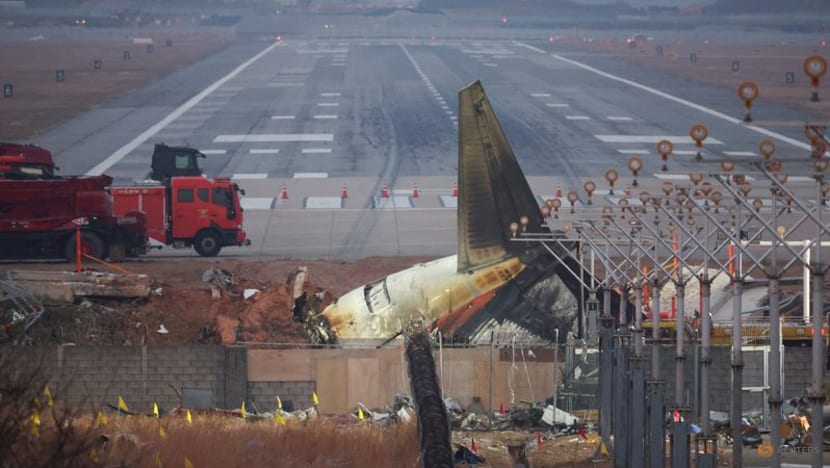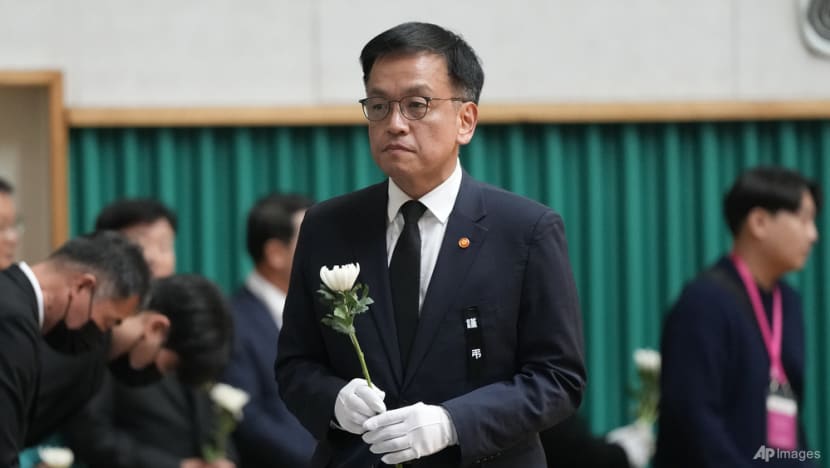Commentary: Jeju Air crash comes at the worst time for South Korea
The Jeju Air crash could not have come at a worse moment for South Korea, says political scientist Dylan Motin.

The wreckage of the Jeju Air aircraft that went off the runway and crashed lies at Muan International Airport, in Muan, South Korea, Dec 30, 2024. (Photo: Reuters/Kim Hong-Ji)

This audio is generated by an AI tool.
SEOUL: On Sunday (Dec 29), a Jeju Air flight from Thailand crashed at Muan International Airport in South Korea, claiming the lives of 179 people, most of whom were Korean holidaymakers.
The crash could not have come at a worse moment for South Korea, which is currently facing a leadership power vacuum.
In less than a month, South Korea has had three different presidents assume the country’s highest office.
It is in the midst of this institutional instability that the Muan Airport disaster occurred, the deadliest plane crash in recent Korean memory.
ONE MONTH, THREE PRESIDENTS
The country is still reeling from the fallout of South Korea's now-suspended President Yoon Suk Yeol's failed bid to impose martial law on Dec 3.
Yoon was stripped of his duties by parliament on Dec 14, and a Constitutional Court trial is ongoing on whether to remove him from office or restore his presidential powers. In the interim, Prime Minister Han Duck-soo had assumed the role of acting president, but he too was impeached on Dec 27, leaving Minister of Economy and Finance Choi Sang-mok as the new acting president.

Even before the plane crash, Choi faced a challenging situation. He may not stay on the job long. The National Assembly needs only 150 votes to impeach an acting president, meaning the opposition bloc - which holds 192 of the 300 seats in parliament - can fire Choi almost at will.
If, like Han, Choi fails to promulgate Yoon-related laws and appoint Constitutional Court candidates, he may have only a mere few days left in office, as the Democratic Party has already warned.
Choi, who has publicly denounced Yoon’s martial law attempt, is probably torn between acquiescing to the opposition’s demands to remain in power or face impeachment in order not to be perceived as betraying the conservative hardliners, who still stand with Yoon.
Therefore, Choi will probably try his best to deal with the disaster and occupy media space to establish his legitimacy. He has expressed his emotion and promised to do his best to support the grieving families and facilitate a thorough investigation.
He has also announced seven days of national mourning, with memorial altars to be established throughout the country. He has declared Muan a special disaster zone, allowing for more state resources to flow in. Finally, Choi has also ordered an urgent safety inspection of South Korea’s entire airline operations.
Listen:
WORRIES ABOUT KOREA’S CRISIS MANAGEMENT ABILITIES
Choi’s performance will be under intense scrutiny, and not solely because of the ongoing political crisis.
Indeed, the South Korean government has a poor track record of handling disaster situations. The deadly Seoul Halloween crowd crush of 2022 remains a fresh wound, with officials being slow to grasp the situation’s severity and deflecting responsibility in the aftermath. In 2014, the sinking of the ferry Sewol had seen a similarly poor handling, both during and after the event.
On Sunday, a video of the Jeju Air crash showed the plane bursting into flames after it belly landed and slammed into a wall, which, according to some experts, should not have been at the end of the runway.
There is also a controversy on whether the runway was long enough to allow safe landings, as it seems that provincial authorities have been requesting a runway extension from the government for many years.
Based on the experience of past catastrophes, one can expect an intense blame game between the government, regional authorities and air safety officials to start shortly.
It is still too early to assess the impact of the Jeju Air crash on South Korea’s ongoing political crisis. It may add a few days to Acting President Choi’s lifespan in office, as the opposition will probably be reluctant to impeach him in the midst of national mourning. But his period of grace will be very short.
Unlike a large-scale natural disaster or a war, the aftermath of the plane accident does not require much presidential intervention, and from now on, an efficient response can happen without him.
Although incredibly traumatic, the loss of flight 7C2216 does not fundamentally change the course of South Korea’s ongoing political crisis, whose Gordian Knot lies in the fate of impeached President Yoon.
Dylan Motin holds a PhD in political science and is currently a non-resident Kelly Fellow at the Pacific Forum. He is the author of Bandwagoning in International Relations: China, Russia, and Their Neighbors (Vernon Press, 2024).

















